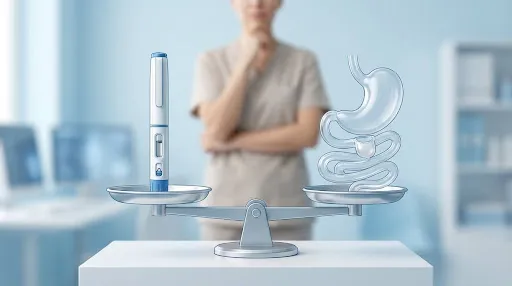Clonidine, known by its brand name Catapres, is a medicine that is primarily used to lower blood pressure. Sometimes, it is also prescribed off-label to treat post-traumatic stress disorder, generalized anxiety disorder, and many other anxiety disorders. However, it can show several fatal effects if misused. Your doctor or healthcare provider may suggest when and how to use Clonidine for anxiety and other mental health disorders. So, let’s explore the article and learn about the effectiveness, uses, dosage, and side effects of Clonidine.
Is Clonidine For Anxiety Good?
Yes, Clonidine or Catapres can help treat anxiety and other mental disorders. Anxiety is one of the most common psychotic disorders that is prevalent worldwide. In the United States, approximately 19.1% of the adult population has struggled with anxiety disorders. It can lead to absence from the workplace and school, and can cause a lot of mental pressure on your mind, with a burden for different things. In recent times, psychiatrists have started prescribing Clonidine because of its wide range of capabilities to treat more than one disease. Those illnesses include anxiety disorders and hypertension.
There can be various anxiety disorders that Clonidine can help with:
-
Generalized anxiety disorder
-
Social anxiety disorder
-
Panic disorder
-
Phobia-related disorders
How Well Does Clonidine Work for Anxiety Symptoms?
Clonidine for anxiety works in some people, mostly when physical tension is high. Doctors use it carefully because the response varies. Research shows mixed results, yet some patterns stand out.
What studies show:
-
One panic-disorder study used IV clonidine (2 µg/kg) and saw a clear drop in anxiety within one hour, but only in panic patients, not healthy adults.
-
An early trial found clonidine reduced anxiety attacks and “psychic” symptoms, though 17% felt worse, so doctors monitor closely.
-
In trauma-linked anxiety, CAPS-D hyperarousal scores dropped from 28 → 18 with clonidine vs 28 → 23 with placebo, showing 21% improvement vs 9% on placebo.
Because results differ widely, clonidine usually works best as an add-on for stubborn anxiety symptoms.
How Does Clonidine Work Inside the Body to Ease Anxiety?
Clonidine works through the central nervous system. It slows norepinephrine release. This signal typically prompts the body to enter an alert state. When it reduces, the body feels calmer.
Effects inside the body:
-
Controls sympathetic activity
-
Slows a fast heartbeat
-
Reduces shakes and tension
-
Helps people with hyperarousal
-
Supports sleep when anxiety rises at night
Doctors use small doses first. They increase slowly based on response.
Common Uses of Clonidine
Since there have been many uses of Clonidine, it is more actively used for the treatment of the following conditions:
-
Anxiety Disorders
-
Combat Nightmares
-
Insomnia
-
Opioid Withdrawal
-
Cigarette Smoking
-
Attention Deficit Hyperactivity Disorder (ADHD)
-
Post-Traumatic Stress Disorder (PTSD)
-
Menopausal flushing
-
Migraine
How Long Does Clonidine for Anxiety Take to Work?
Clonidine starts working in 30–60 minutes for some symptoms. Mind symptoms improve slowly.
Typical timeline:
-
Body tension: same day
-
Sleep: a few days
-
Full effect: 4–8 weeks
-
Dose adjustments: done slowly
Taking it at the same time each day helps steady the response.
How to Use Clonidine for Anxiety?
It is very crucial to ask your doctors about the details of its use. Consider the following guidelines while using Clonidine for anxiety:
-
You can take medicine with or without food or as prescribed by your doctor. It is usually taken twice in the morning and before bed.
-
If none of your medicinal doses is equal, you can also take one dose higher in amount, especially before going to bed. This may help you reduce the side effects.
-
Although the dosage of Clonidine for anxiety is highly determined by the extent of issues you have been going through, never indulge in any practice that may let you have the medicines alone or without any doctor's prescription.
-
To have the best advantages of the medicine, you can try taking the dose regularly or in the same routine.
-
Moreover, do not stop the use of the medication suddenly even when you find some improvement in the symptoms. It can lead to withdrawal risks.
Note: We recommend you to have the proper consultation before taking medicine. This is because the medicine can highly affect you mentally, physically, brain, and blood pressure.
Missed Dose -
Never try to take the missed dosage of any medicine at an irregular time. You can resume your routine even if you have missed your dose. Also, you don't need to increase the dose the next time, especially if you have missed one. This can lead to severe side effects of overdose. It is better to consult the doctor for the proper prescriptions and consultations.
Side Effects of Clonidine
Clonidine can also come with some side effects. Seek medical help, if you experience the following side effects:
-
Dry Mouth
-
Fever
-
Weakness
-
Fatigue
-
Anxiety
-
Nausea
-
Vomiting
-
Agitation
-
Headache
-
Constipation
-
Abdominal pain
-
Low sexual activity
Also, you may need immediate medical attention, if you develop severe side effects such as:
-
Difficulty breathing or swallowing
-
Swelling in the feet, throat, face, lips, eyes, hands)
-
Hives
-
Rashes
-
Hoarseness
-
Low blood pressure
Does Clonidine Produce Any Side Effects Due to Addiction & Withdrawal?
Yes, the short answer is Yes! If you have been using clonidine tablets for a long time, your body may get addicted to them. According to the American Addiction Centers, the potential symptoms of clonidine addiction may include:
-
Uncontrollable drug use
-
Increased tolerance
-
less responsible at work or home
Moreover, if you stop taking the clonidine abruptly, you can face withdrawal risks. According to the FDA, certain withdrawal symptoms may affect your body. The side effects may include:
-
Tremors
-
Headaches
-
Insomnia
-
Depression
-
Anxiety
-
Fatigue
-
Increased agitation
Note: If the symptoms become severe, this can also lead to the urge to die, showing serious and life-threatening symptoms, especially during the withdrawal time. So, if you are witnessing these symptoms, try consulting the doctor after a short period. Ask if you require any change. Also, keep on discussing your doctor about your medical conditions. This may help the providers refer you to another medicine in your time of need.
Drug Interactions
Always be cautious when you are using clonidine with other medications that you might be taking for other health issues. The reason is the possible interaction with different medications that may slow breathing and cause sleepiness. So, avoid taking clonidine with these other drugs:
-
Sleep medicines
-
Antidepressants
-
Beta-blockers
-
Neuroleptics
-
Barbiturates or other sedating drugs
In addition, avoid alcohol when taking clonidine as it can increase certain complications. It can worsen the side effects of the medication. Moreover, it can cause the risk of fainting, sleepiness, headaches, and changes in heart rate and pulse. So, always talk to your healthcare provider about your medical history before taking Catapres for anxiety. This can help avoid unpleasant effects.
Important note: If you or anyone you know intends to use Clonidine, consult the healthcare provider first. You can explain your circumstances or the issues you have been going through. If you have any mental disorder, you can share symptoms that may be similar to other hypertension and high blood pressure issues. This is because it may interfere, and you can not wholly use the drug for all the major issues at one time.
Precautions
Take the following precautions when using clonidine:
-
Limit the intake of alcohol as it can lead to interaction.
-
Avoid dehydration and overheating during hot weather or intense exercises as it can lead to dizziness or fainting.
-
Sometimes, you may develop a rash, hives, or other allergic reactions while using the clonidine patches. So, if you have been allergic to any medicinal uses of clonidine, consult the doctor for the proper use.
-
Always tell the doctor about your medical history or any major issues like kidney problems, heart rhythm problems, or any body part pain. These factors can worsen the side effects of clonidine.
-
Clonidine can lead to eye dryness. So, if you use a contact lens, this drug can create a problem. So, discuss it with providers first.
-
It can also lead to mouth dryness. So, if dryness lasts for 2 or more weeks, seek medical attention.
-
If you are pregnant or breastfeeding your child, you should consult the doctor for its proper use.
Alternative Treatments for Anxiety
You can consider some medication and non-medication approaches.
Medical options:
-
SSRIs
-
SNRIs
-
Propranolol
-
Benzodiazepines (short term)
Non-medical options:
-
Yoga
-
Breathing work
-
Group support
-
Daily exercise
Final Takeaway
Clonidine for anxiety helps certain adults, especially when symptoms sit inside the body. Research shows promise in panic disorder and hyperarousal. Response differs, so doctors guide the dose slowly. With the right plan, clonidine supports long-term anxiety care along with therapy and lifestyle changes.
Frequently Asked Questions
Who cannot take clonidine?
Women trying for pregnancy or are pregnant or breastfeeding should not take clonidine. Moreover, people with kidney or heart issues should also avoid it.
Can clonidine make my anxiety worse?
Yes, it can do that in cases where you overdose on it or suddenly stop its use.
When is the best time to take clonidine for anxiety?
You can either use it in the morning or evening, one time a day. Most people choose to have it around bedtime as it can help you feel sleepy.
What is an alternative to clonidine for anxiety?
You can choose Lotensin (benazepril), Vasotec (enalapril), Accupril (quinapril), Altace (ramipril), or Cozaar (losartan).
Can clonidine stop panic attacks?
Though it can completely cure panic attacks, it can manage the possible symptoms.
What is the clonidine for sleep and anxiety dosage?
For sleep disorders, take 0.17 mg before bedtime each day while for anxiety take 0.1 mg two times a day.
-User-1754380331.png)
Reviewed by








